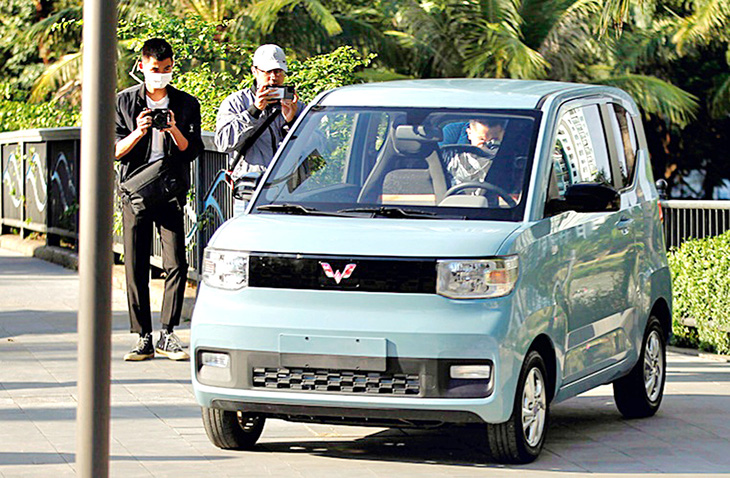The Vietnamese low-cost electric vehicle (EV) market is promising to boom with a series of Chinese brands launching plans to assemble and distribute their products in Vietnam.
The local EV market may be flooded with super cheap units although the after-sales service and quality of these vehicles are unknown.
Bui Van Huu, chairman of TMT Automobile Joint Stock Company (TMT Motors), a Vietnamese auto firm, said his company will pioneer the distribution of China’s HongGuang MiniEVs 4 in Vietnam.
The firm joined hands with the joint venture of General Motors and SAIC – WULING in mid-February this year to exclusively manufacture, assemble, and distribute EVs of General Motors and SAIC – WULING in Vietnam.
According to TMT Motors, the EVs will be assembled in a factory in Hung Yen Province, northern Vietnam with a capacity of 30,000 units per year. The vehicles are suitable for use in urban areas and can replace motorbikes.
HongGuang MiniEVs are priced at over US$4,000 each. The price in Vietnam has yet to be announced officially but it was supposed to range between VND100-260 million ($4,263-11,085) each.
Meanwhile, the lowest price of EVs of other auto firms, such as VinFast, MG, Kia, Mercedes, and Audi, are at about VND700 million ($29,794) each, while some cost up to VND6 billion ($255,794) apiece.
The trend of Chinese automobile enterprises flocking to Vietnam continues with Haima returning to the Southeast Asian country early this year. The firm previously withdrew from the Vietnamese market due to ineffective business.
Haima has sought assemblers and traders for Haima 8S, 7X, and 7X-E models in Vietnam.
The general director of an auto assembler in Ho Chi Minh City told Tuoi Tre (Youth) newspaper that Chinese EV brands have returned to the Vietnamese market with many products. His company has also assembled several electric car and truck models.
He said that low-cost EVs are priced at some VND200-260 million ($8,526-11,085) each, adding that they cannot travel over a long distance at a high speed. However, they will still have their market due to the low costs.
According to some other experts, the low cost is not a decisive factor to attract buyers.
In Vietnam, small autos, such as Honda Brio, Toyota Wigo, and Suzuki Celerio, which are priced at VND350-500 million ($14,899-21,284) each, have experienced a slump.
Associate Professor Dr. Ly Hung Anh from the Ho Chi Minh City University of Technology said in 1998-2005, a huge volume of Chinese low-cost motorbikes entered the Vietnamese market at VND6-8.5 million ($255-361) each.
The loose management caused the local market to be flooded with poor-quality, unsafe, and environmentally polluting vehicles.
They were later abandoned gradually and have nearly disappeared from the domestic market.
Anh said if EVs are manufactured in high volume and with low costs, risks will outweigh the benefits.
Nguyen Minh Dong, another auto expert, shared the view, calling on consumers not to boycott Chinese-made vehicles.
The development of budget mini EVs is a positive trend but the vehicles and their batteries should be managed closely to protect the environment.
Many auto experts agreed that low-cost EVs may apply outdated technology. It is a must to prevent Vietnam from becoming a dumping site of EV batteries, not to mention risks to traffic safety.
Therefore, the import of equipment for EV manufacturing and assembly should be put under strict control, Dong noted.
Tran Nhu Phuong, deputy general director of Ford Suoi Tien in Ho Chi Minh City, said all cars are checked before being put into use.
However, criteria and standards for EVs, batteries, and charging stations need improving.
Chinese autos: easy to buy, hard to resell
Gasoline- and oil-powered cars made in China have been increasingly imported into Vietnam.
After using a Beijing X7 car for a year, Nguyen Trong, residing in Binh Thanh District, Ho Chi Minh City, said he is satisfied with the vehicle.
Chinese autos are at an advantage in features and fittings compared with other autos in the same segments and with equivalent prices.
“Many people have asked me if the car is durable and if I feel secure when using it," Trong added.
“Honestly, I have used it for over a year, so I do not dare to affirm its quality but its technology and design are good. It’s convenient to drive it in the inner city.'
At present, 'made-in-China' autos are sold in Vietnam at below VND800 million ($34,108) each. For example, Zotye T800, Dongfeng T5, and Beijing X7 cost VND728 million ($30,988), VND700 million ($29,796), and VND750 million ($31,925) apiece.
However, second-hand auto traders are hesitant about Chinese-origin cars.
Quoc Hung, the owner of an old auto showroom called Hung Auto in Thu Duc City, under Ho Chi Minh City, said second-hand autos with Japanese, South Korean, and German brands have higher costs than Chinese ones.
Hung earlier bought a Baic Q7 unit which had run over 20,000 kilometers at VND390 million ($16,600) but he could not find a buyer for the vehicle after three to four months.
As a result, he had to suffer a loss of some VND30 million ($1,278) to sell the car.
According to the General Department of Vietnam Customs, 17,340 Chinese autos worth more than $714 million were imported into Vietnam last year.
Like us on Facebook or follow us on Twitter to get the latest news about Vietnam!


















































